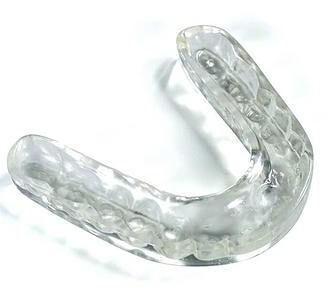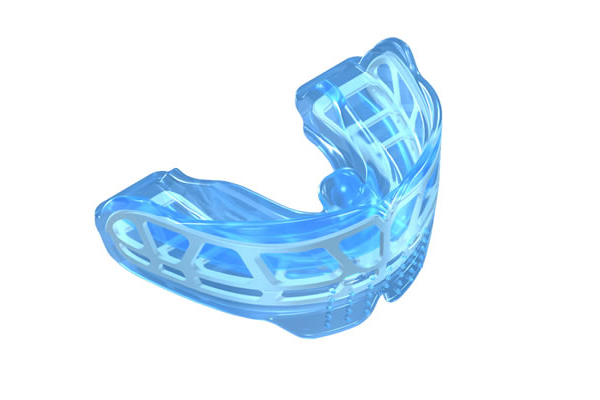Nightguards and Splints
Bruxism is the dental term for teeth grinding and clenching. Grinding and clenching may cause wear of the enamel of the teeth sometimes even fractures of the teeth, recession of the gums (the pulling down of the gum tissue from its natural level), bone loss around the teeth and TMJ (jaw joint) disorder.
Many people are not aware of a grinding/clenching habit until their dentist or dental hygienist point out warning signs within the mouth. Also, people who grind/clench may have extraoral symptoms such as headaches, ear, neck, facial or jaw pain. Grinding usually occurs during the night because it is a subconscious neuromuscular disorder. Clenching can occur during both the day and night.
Nightguards
A custom-made night guard is recommended for those who grind/clench their teeth to prevent further wear/breakdown of the tooth structure. Use of a nightguard can also help relax the TMJ (jaw joint), muscles of the face, head, and neck thus preventing excess strain and the subsequent discomfort that may come with it. Keep the TMJ joint in a neutral position with a night guard fitted to your mouth. Night guards that are custom fit by the dentist leave the TMJ (jaw joint) in neutral position. The guard trains the joint to relax and relieves pressure.
Identification of grinding/clenching habit
If you grind/clench your teeth while you sleep, you may wake in the morning with painful teeth, jaw joint, neck or facial discomfort. Sometimes even a spouse notes the noise that originates due to grinding/clenching of the teeth.
Grinding/clenching can also occur in children. Sometimes it goes away by the time children reach the age of 10, other times it may get worse. When the permanent teeth erupt, the alignment of the teeth can sometimes play a factor in whether the habit continues.
Grinding or clenching also may occur during the day. It is more likely that a person may clench during the day, this may happen when a person is stressed, tired or it simply may be a habit.
There is no scientific explanation for grinding/clenching and most dentists do not agree on the origination. This neuromuscular disorder has had many theories linked to it; misalignment of the jawbone(s), genetics, allergies, intake of caffeine, tobacco or amphetamines. Regardless, a nightguard can help prevent much of the pressure on the teeth.
If you think you may benefit from a nightguard call our office at (780) 624-9464 or request a consultation online here.


© 2025 Wing Dental and H-cube Marketing, www.DentalGrowthStrategies.com. All Rights Reserved.
